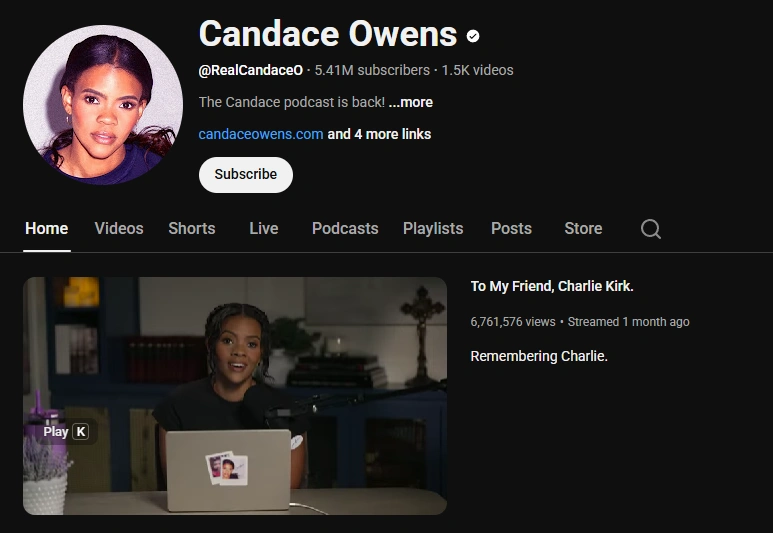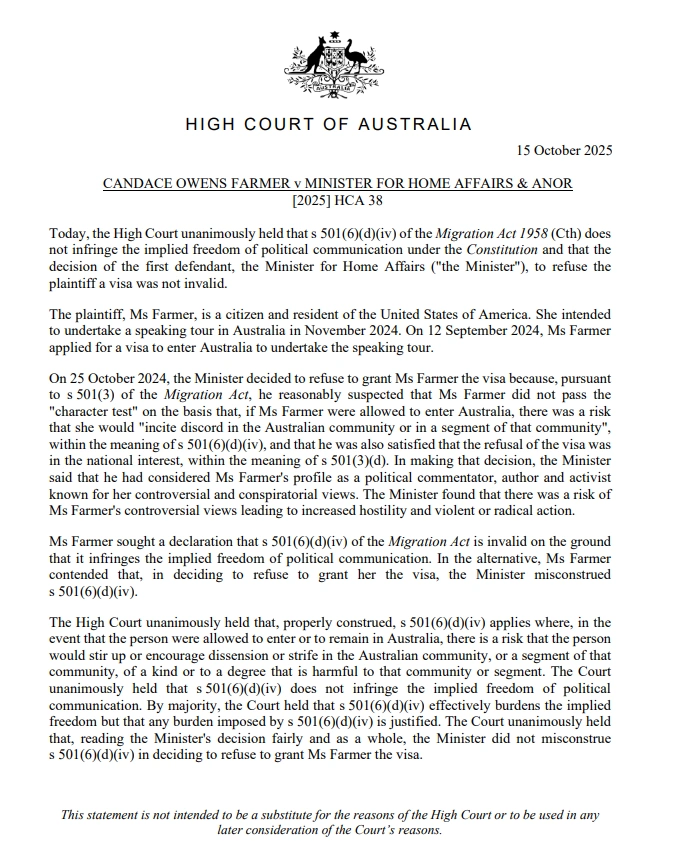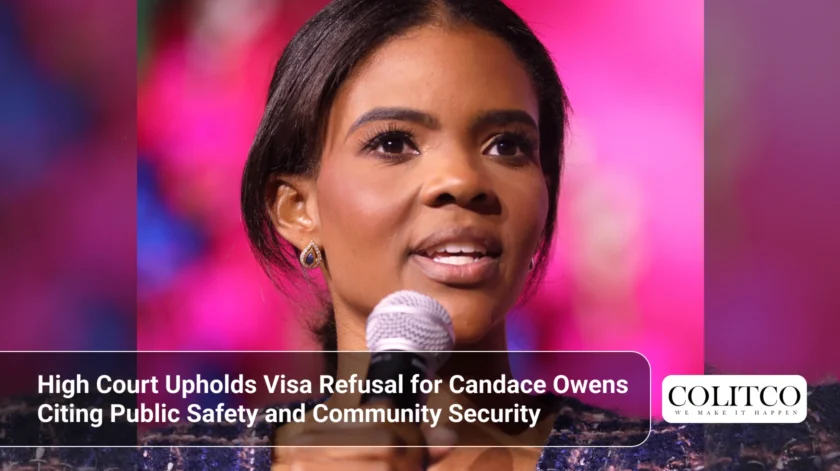The High Court of Australia has upheld the government’s decision to block American commentator Candace Owens’ visa application. The ruling confirms the government’s decision to refuse her temporary visa on grounds of national interest and community harmony.
Background of the Case
Candace Owens, a U.S.-based political commentator with over 5 million YouTube subscribers, had planned a speaking tour across Australian cities in November 2024. The tour was scheduled to include Sydney, Perth, Melbourne, Adelaide, and Brisbane. Her visit aimed to discuss topics such as freedom of speech and political commentary that some groups found controversial.
In October 2024, Home Affairs Minister Tony Burke exercised his authority under the Migration Act. He rejected Owens’ visa application, citing a character test failure. The minister’s decision was based on concerns that Owens’ presence could incite community discord and unrest, threatening Australia’s social cohesion.
 Candace Owens’ YouTube channel
Candace Owens’ YouTube channel
Reasons for Visa Refusal
Minister Tony Burke highlighted Owens’ history of public statements that raised concerns. This history included Holocaust denial, Islamophobic remarks, and inflammatory commentary on various communities. Notably, he cited Owens’ 2024 remarks dismissing narratives about Nazi experiments on twins in concentration camps as “com absurd” and “b propaganda.”
Burke also referenced that Brenton Tarrant, perpetrator of the Christchurch mosque attacks, identified Owens as a major influence on his extremist views. The minister emphasised that such influences contribute to risks of violent acts and community discord. His assessment concluded that allowing Owens into Australia posed a risk contrary to the national interest.
 Official statement by the High Court of Australia
Official statement by the High Court of Australia
Legal Proceedings and The High Court’s Ruling
Owens challenged the visa refusal, arguing that it restricted her implied right to political expression. Her legal team claimed the minister misinterpreted migration laws. However, the High Court unanimously ruled that the Migration Act provisions used to block her visa are lawful.
The court found that the law permits the refusal of visas to individuals who may incite or promote discord that threatens the Australian community. Judges affirmed that the implied freedom of political communication is not absolute when weighed against public safety and community harmony.
The court supported the minister’s interpretation that preventing potential extremist influence aligns with Australia’s national interest. It found no unconstitutional burden on political expression in this context.
 Candace Owens challenged the visa refusal
Candace Owens challenged the visa refusal
Community Responses
The decision drew varied responses from community groups. The Anti-Defamation Commission, which represents Jewish interests, called the ruling a “victory for truth.” They emphasised the importance of preventing denial and distortion of historical atrocities.
Other community leaders and advocacy organisations supported the government’s stance to protect multicultural social stability. Meanwhile, some commentators questioned the limits placed on free speech, but the ruling reinforced the precedence of community security concerns.
Impact on Owens’ Tour and Public Discourse
The visa block effectively cancelled Owens’ scheduled speaking engagements in Australia. Her planned discussions about freedom of speech and political topics will not reach Australian audiences as intended.
Minister Burke stated, “Australia’s national interest is best served when Candace Owens is somewhere else.” This statement underscored the government’s commitment to preventing divisive influences from entering the country.
Owens’ case highlights the Australian government’s approach to visa control based on thorough character assessments. It emphasises a balance between upholding free speech and preventing threats to public order and safety.
Legal Framework and Migration Law
The Migration Act allows visa refusal if a person does not meet the character test or if their presence is against the public interest. Under section 501 of the Act, the minister can refuse or cancel visas for individuals who pose risks of inciting discord or harm.
The High Court ruling confirmed that these provisions do not infringe upon the implied freedom of political communication protected under Australia’s constitutional framework. The judgment affirms that national security and social harmony considerations justify limitations on entry.
Also Read: Supreme Court Rejects Alex Jones Appeal Over Sandy Hook Defamation Judgment
Statistical and Factual Context
Australia has experienced challenges related to extremist influences and community tensions in recent years. Measures under the migration law contemplate these realities to safeguard society.
The Christchurch mosque attacks in 2019 deepened the focus on preventing the entry of persons promoting extremist views. The government’s decision to refuse Owens’ visa is part of broader efforts to mitigate risks of incitement and violence linked to political extremism.
Conclusion
The High Court’s decision upholds the government’s right to refuse visas on grounds protecting Australia’s national interest. It reinforces that visa approvals are conditional on character assessments assessing risks to community harmony.
Candace Owens’ planned speaking tour across Australia will not proceed following this ruling. The government’s firm stance aims to ensure public safety and uphold social cohesion against divisive influences.
This outcome confirms the precedence of national interest and public security in migration decisions, reflecting Australia’s commitment to maintaining peaceful and inclusive communities. Further developments regarding Owens’ legal options or public commentary remain awaited.












